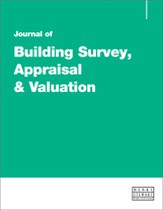Damp, its causes and the implication in leasehold property
Abstract
There is a wide variety of methods of resolving damp within buildings that seems to vary between opening a window to installing vertical and horizontal membranes together with replacing wall plaster that has been damaged by the water penetration. How successful each of these various methods have been is not easy to establish. To gather evidence, the judgments of the Court of Appeal in landlord and tenant cases does reveal what did not work and sometimes why. Not every type of damp-proof treatment has been shown to have been tested. The repairing method selected is often set out in the calculation of damages. In order to catalogue the evidence presented to the various courts, the dampness has been divided into three groups: that caused by condensation, that resulting from ground water, and squeezing in a case where the external cladding had failed. The remedy to the damp entry varies from knocking the building down and starting again, replacing the wall plaster and the damp course, to expecting better management of the conditions to reduce their effect upon the property. Each judgment has been made in reliance upon expert evidence put before the court. In some cases it can be seen that incorrect evidence has misled a judge and the outcome is flawed. ‘Our adversarial system depends heavily on the independence of expert witnesses, on the primacy of their duty to the court over any other loyalty or obligation, and on the rigour with which experts make known any associations or loyalties which might give rise to a conflict.’
The full article is available to subscribers to the journal.
Author's Biography
Malcolm Hollis has been active in private practice while maintaining his personal interest in research and education. In 1991 he set up Malcolm Hollis Chartered Surveyors (now Hollis). He has been a chartered surveyor for nearly 50 years and a partner or director of professional surveying practices for more than 35 years. He has inspected an eclectic range of buildings, including a cathedral, royal palaces, military domes and a nuclear reactor as well as a wide range of commercial and residential property. He has dealt with the settlement of over £80m of dilapidation claims. Malcolm has been professor of building pathology at the University of Reading (now Henley) since 1988 and been an external examiner to universities in the UK, Italy, Hong Kong and Malaysia. He has written ten books including Surveying Buildings, Surveying for Dilapidations and Pocket Surveying Buildings and produced research and conference papers on matters including surveying, valuation, flooding, fire and building failure and collapse. He is on a wide range of editorial boards. Malcolm was a member of the Building Surveyors’ Divisional Council and has been a member of many working parties within the RICS, including those for surveys, valuations, commercial property and conduct. He was a member of the president’s commission to China. He was a member of the working parties that produced the RICS Guidance Notes on Residential Surveys and a member of the executive committee and member of council of the Academy of Experts 2004–11. He was on the validation board for the RIBA. Malcolm has given evidence in over 60 matters within Chancery, the High Court, Technology and Construction Court, Crown Courts, County Courts and Magistrates’ Courts in both civil and criminal actions in England, Scotland, Wales, Guernsey, the Netherlands and Belgium.
Citation
Hollis, Malcolm (2021, September 1). Damp, its causes and the implication in leasehold property. In the Journal of Building Survey, Appraisal & Valuation, Volume 10, Issue 2. https://doi.org/10.69554/RFPC3194.Publications LLP
